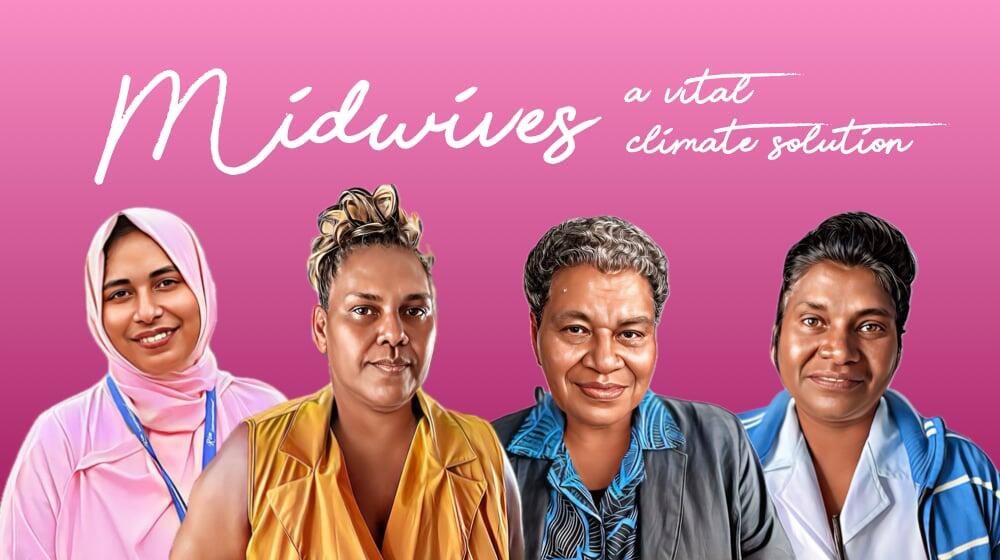Midwives are the heroes of millions of stories. Not only do midwives provide culturally sensitive health care, they are often respected community leaders and emergency responders for crises like climate disasters.
Midwives promote health and save lives, all while respecting women’s and girls’ choices and fulfilling their right to health. As the backbone of community-based sexual and reproductive health services, midwives are a critical gateway to health services, especially for the most marginalized.
When climate disasters hit or conflict breaks out, midwives are first responders within communities – they represent the most effective way to avoid preventable maternal deaths, prevent unintended pregnancies and mitigate gender-based violence.
A global shortage of nearly one million midwives and a lack of international commitment to invest in their training, development and support limits their reach and endangers the women and girls who rely on them for care. This collection of profiles from around the Asia Pacific region presents a snapshot of 7 of the millions of midwife heroes that are on the frontline of climate impacts coping with daily crises that affect women’s health and dignity.
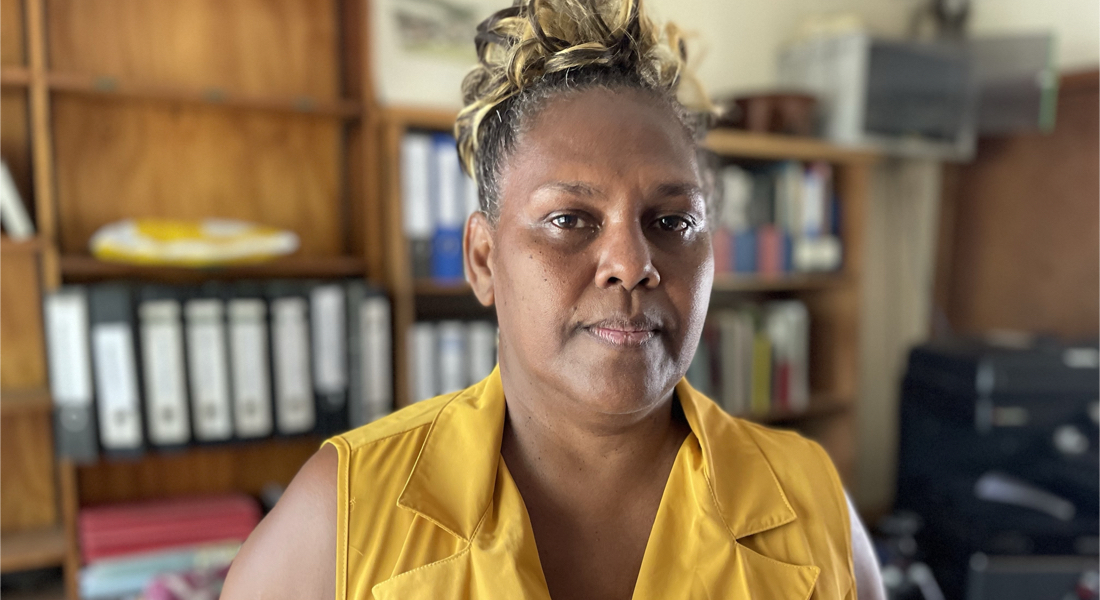
Solomon Islands: Bethlyn Warereau is a midwife working with Solomon Islands government on maternal health. “I love the first embrace when the baby is just born,” Bethlyn says. “The first moment of life, coming into the world is very important. Sometimes, something can go wrong and the baby can die. The baby’s first breath is so special.”
Bethlyn was just beginning her career as a midwife when Tropical Cyclone Ita resulted in a severe flooding of the Mataniko river in the capital of Honiara in 2014. Dozens of people were killed and nearly 10,000 people were displaced. Bethlyn went around the improvised camps and shelters and worked to determine how many women were there and how she could help meet their needs by organising women’s circles where they could talk about menstrual hygiene needs and urgent sexual and reproductive health issues.
Today Bethlyn works with the Ministry of Health and Medical Services to ensure that there is enough capacity in the country for emergency obstetric and newborn care. “In Solomon Islands, there needs to be a skilled nurse or midwife, attending every baby being born,” especially as the population is growing.
“During a disaster such as a climate crisis, we need to prevent unintended pregnancies and prevent maternal mortality and morbidity," Bethlyn says. "We can do so much more to prevent and respond to gender-based violence as well. We have cyclones happening more often in our country. Proper coordination and planning will reduce maternal deaths and mitigate violence.”
“We are building a pool of health personnel like midwives, doctors, nurses trained specifically in maternal health during crisis and emergencies. These teams can be deployed to these disaster areas and provide maternal health services, as well as care the survivors of sexual violence. Whenever disaster strikes any province, they should be among the first ones to be deployed.”
“Our work in the communities is important because it will reduce more morbidity and mortality among mothers and babies, that is our goal.” ©UNFPA/Rose
Increasing the coverage of midwives by 25 percent could avert about 40 per cent of maternal and neonatal deaths and over a quarter of stillbirths – saving some 2.2 million lives annually by 2035. (1)
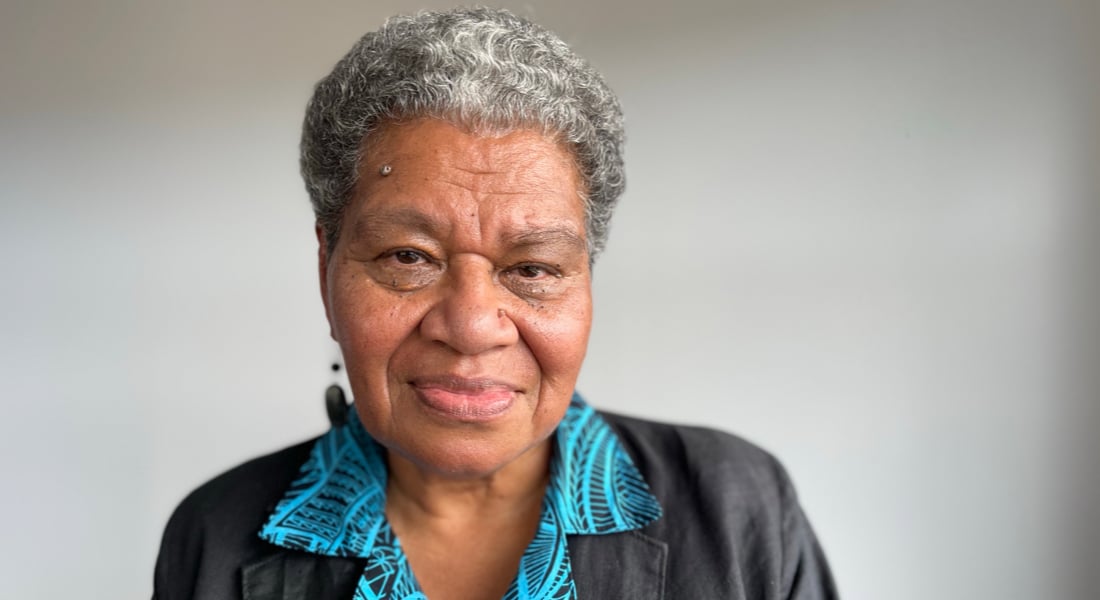
Fiji: Litia Naralulu is a retired Fijian midwife who has gone through multiple climate disasters. When emergencies strike, women and girls are most at-risk. Pregnancy-related deaths and unintended pregnancies increase as essential sexual and reproductive health services become disrupted. Emergencies can also increase the risk of multiple forms of gender-based violence. UNFPA’s humanitarian team is prepared to respond even before a disaster to protect the health and protection needs of communities in crisis. This includes maintaining a roster of healthcare providers including retired midwives, emergency logistics personnel, emergency response coordinators, health care workers and gender-based violence responders from within the Pacific region who have been trained for humanitarian response and can be quickly mobilised to reinforce the health workforce in a disaster-stricken country and strengthen lifesaving SRH services.
Litia worked in Vanuatu after Cyclone Pam devastated the country in 2015 and she helped mothers give birth in an outer island of Fiji following Cyclone Yasa in 2020. She keeps her skills up to date with regular training on best practices in humanitarian settings. She underscores the special needs of women and girls faced after a disaster, which tends to be overlooked. “When women live in tents together with the other evacuees including men, there’s no privacy. It's an open public place and they have to make do with one toilet and a bathroom. You have to be careful, especially if you are a woman. There’s a vulnerability because there’s no privacy, and that impacts their dignity to do their daily things in a private and safe place.” ©UNFPA/Rose READ MORE
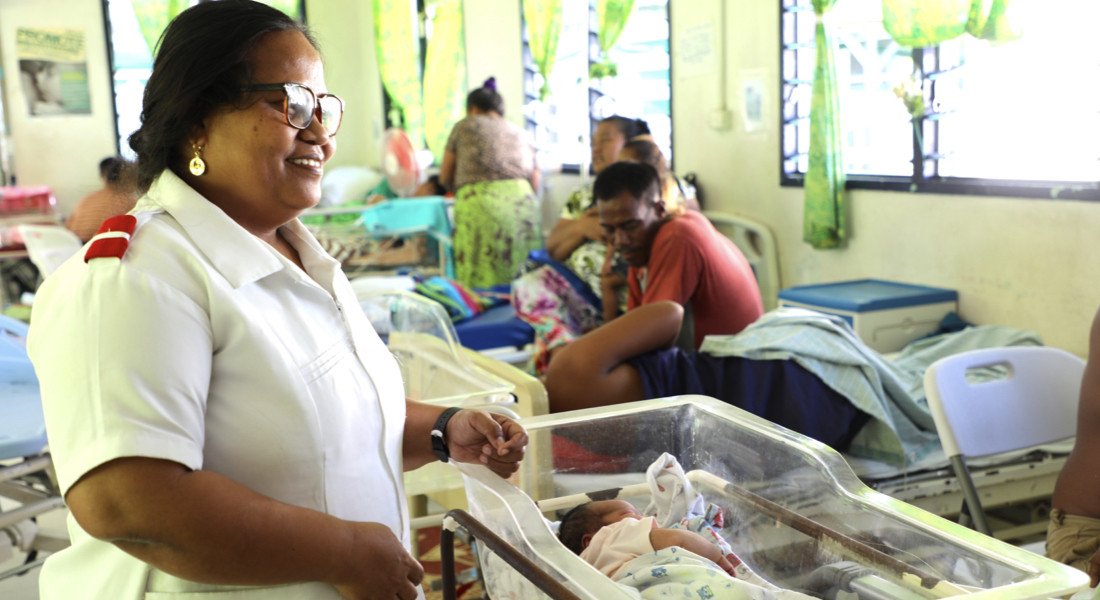
Kiribati: Midwife Maii Terubea is the Sister-in-Charge of the bustling obstetrics ward in Tungaru Central Hospital, the country’s main hospital in the capital of Tarawa, where she oversees a team of 18 midwives. With its limited infrastructure of 16 beds for antenatal and postnatal care, and only two beds for deliveries, the ward struggles to accommodate the steady stream of expectant mothers, as the country’s youth population continues to increase.
“In this month alone we have delivered 136 babies,” Maii says, feeling a mixed sense of accomplishment and strain, as she surveys the overcrowded beds and noted the shortage of resources. “The scissors are too blunt for caesarean sections. Also, if more mothers are coming in, we will have no option but to have to deliver the babies on the floor.”
This makeshift solution is born out of necessity, due to the limited access to and scarcity of resources available in the small island developing state (SIDS).
Despite their efforts, Maii says she cannot shake the feeling of being undervalued. “There is a lack of recognition of our occupation and qualifications,” she says, noting how her team of midwives work tirelessly, but are often overshadowed by doctors.
The looming crisis of climate change also casts a shadow over midwives in Kiribati. Rising sea levels threaten to engulf the low-lying islands, exacerbating existing challenges and jeopardising its already sparse health infrastructure.
Maii and her team grapple with not only the immediate demands of childbirth during crises, but also with the long-term implications of environmental degradation, compounded by the ‘brain-drain’ due to the increasing emigration of skilled health workforce, and how these trends affect the safe delivery of mothers who often travel hours via boat to access the hospital.
Amidst the challenges, Maii leads her team with determination, fostering resilience in the face of adversity. She is fuelled by her pure passion and duty to serve, and is appreciative of the generous contributions and support from UNFPA and donors.
“Working as a midwife is great and rewarding,” Maii says, her voice carrying a sense of purpose and pride. “We are saving lives.” ©UNFPA/Jayasinghe READ MORE
Midwives can deliver 90 per cent of all essential sexual, reproductive, maternal and newborn health services, yet because they are both underutilized and in short supply, they account for only 10 per cent of those currently providing these services. (2)
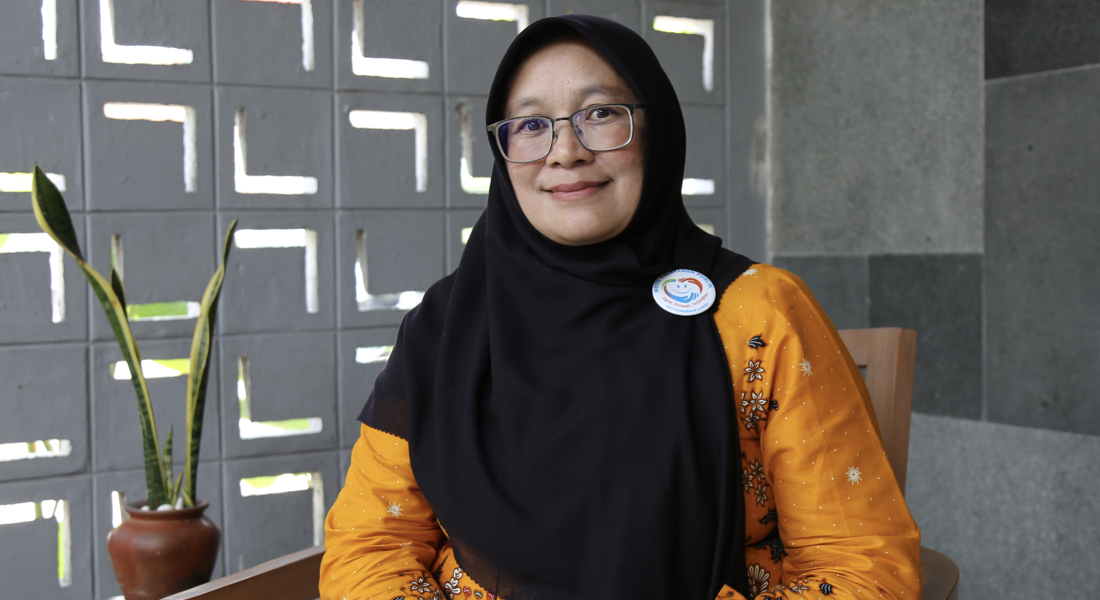
Indonesia: Siti Qodariah is a midwife in charge of Basic Emergency Obstetric and Newborn Care (BEmONC) at the community health centre in South Garut. In her region, geographical challenges pose economic and social barriers, so midwives like Siti lead efforts to make sure pregnant women and mothers can access life-saving maternal health services. Extreme weather fuelled by climate change increases the multiple barriers for women to access care.
“The distance is extraordinary, the roads are extremely steep,” she says. “There are areas that cannot be passed by motorised vehicles, so the patients who live in a remote area are carried by their family on a stretcher to reach the village. Then they take a car to reach the birthing facility.” For some mothers it can take up to 3 hours from where they live to the facility. Because the road is very steep, they need a special vehicle called a ‘odong-odong’. Siti says it's like an ugly car but it’s prohibitively expensive. “For a one-way trip the family could spend up to 400,000 rupiah ( USD $25), so for a two-way trip, it could cost 800,000 rupiah.”
“Most people here are farmers or labourers,” Siti says. “On average, farmers earn just 500,000 rupiah (USD $31) from selling their monthly harvests. In remote villages, the midwives are usually very active. They have a savings program for pregnant mothers, where each pregnant mother can save to cover the transportation costs. This is one of the midwives’ initiatives to address the accessibility issue.”
Siti says pregnant mothers can be reluctant to give birth at health facilities because of self-consciousness, embarrassment and the costs. “We try to help by facilitating their national insurance registration so the high costs will not be an excuse to access the health services.” The multi-faceted approach is increasing the number of births at the facility and demonstrating some promising results. “Alhamdulillah (praise be to God), we have not had any maternal deaths since 2020. For the last three years at my facility we have had zero maternal mortality.” ©UNFPA/Rahmi Dian Agustino READ MORE
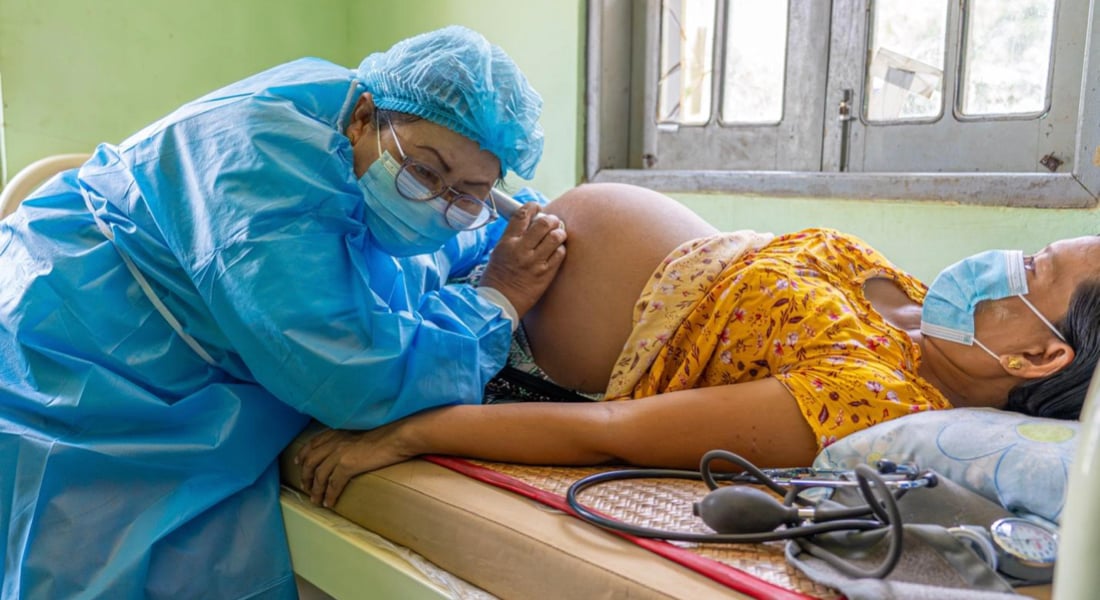
Myanmar: Daw San Win Phyu is a midwife with over 30 years of experience, "As a midwife, I provide health support for the people in the community," she says. She delivers life-saving sexual and reproductive health information and referral services, including ante-natal, delivery and postnatal care, basic emergency obstetric care, family planning, post abortion care, protection and prevention of mother-to-child transmission of HIV, sexually transmitted infections and basic health care for people in the community. She also offers mental health and psychosocial support, understanding the emotional and psychological challenges pregnant women face.
"Many local people here are poor and in need of our support,” she says. “A helpful word can be a powerful remedy. I encourage them and tell them not to worry since I am here to help them."
The women and girls of Myanmar have endured years of crises, including an ongoing civil conflict and the climate-fuelled impacts of extreme weather like floods and droughts that affect every aspect of society. In this context of communities in crisis, overstretched health clinics that often lack the resources to cope with emergency births, midwives like Daw San Win Phyu go the extra mile to make the difference.
"Sometimes I go out at night for emergency delivery,” she says. “There have been nights when I was requested for delivery two to three times. When I see the faces of newborn babies, my own weariness melts away.”
UNFPA plays a major role in supporting midwives across Myanmar. In 2023, UNFPA expanded its midwifery programme into humanitarian-affected regions like Sagaing, Magway, Bago, and Kayin, while continuing to support existing clinics in Yangon, Mandalay, and Ayeyarwady Region. These efforts enhance the delivery of quality midwifery care and foster the midwifery networks that encourage collaboration among midwives, volunteers, and obstetricians and gynaecologists.
UNFPA has supported the education and training of close to half a million midwives worldwide, trained over 100,000 midwifery faculty members and invested in over 1,600 midwifery schools. (3)
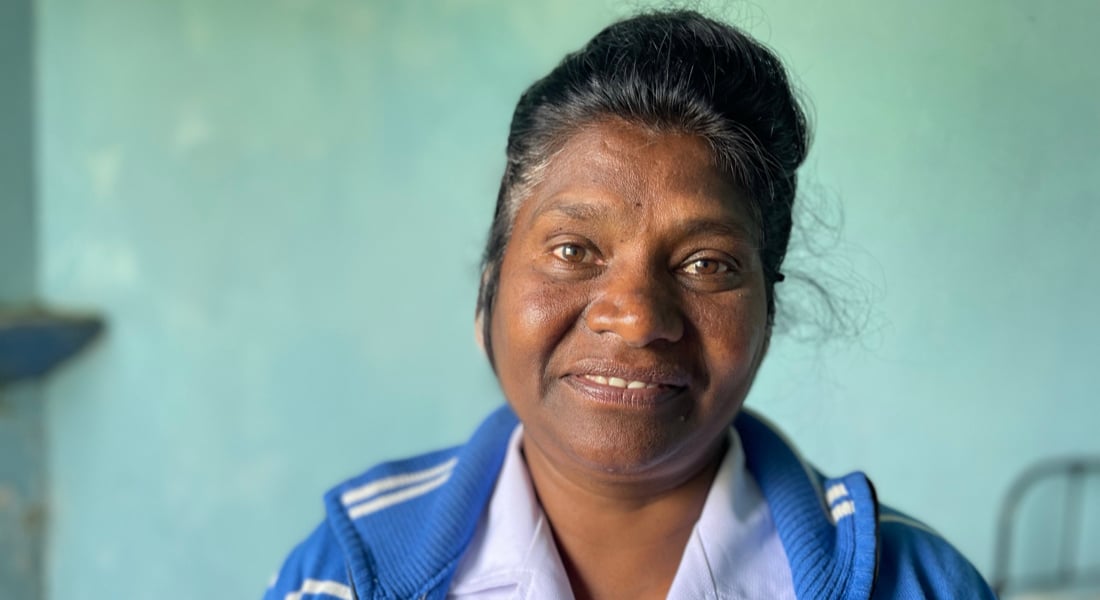
Sri Lanka: “I've devoted 35 years to midwifery,” says Padmakanthi. “I'm dedicated to providing comprehensive healthcare services, including reproductive health and family planning, and offering support to newlyweds and mothers. Regular home visits are a crucial part of my work to improve healthcare accessibility and serve my community better.”
As a midwife, Padmakanthi has been a source of strength and guidance for the estate communities in Nuwara Eliya, located in the Central Province of Sri Lanka. Like everywhere, the community is impacted by the effects of climate change with erratic weather creating more uncertainty for the tea harvest and danger for the women working on the steep and muddy slopes as more extreme storms hit with greater frequency. The more intense weather also makes it more difficult for women to seek care during pregnancy and birth and more challenging for Padmakanthi to do her home visits and reach the women who need her most.
Padmakanthi’s message to aspiring healthcare professionals is simple yet profound, “I firmly believe that with dedication and a genuine desire to serve wholeheartedly, anything is achievable,” she says. "Approach your work with sincerity and compassion. By prioritising the well-being of others and embracing challenges with determination, one can make a lasting impact." ©UNFPA/Rose READ MORE
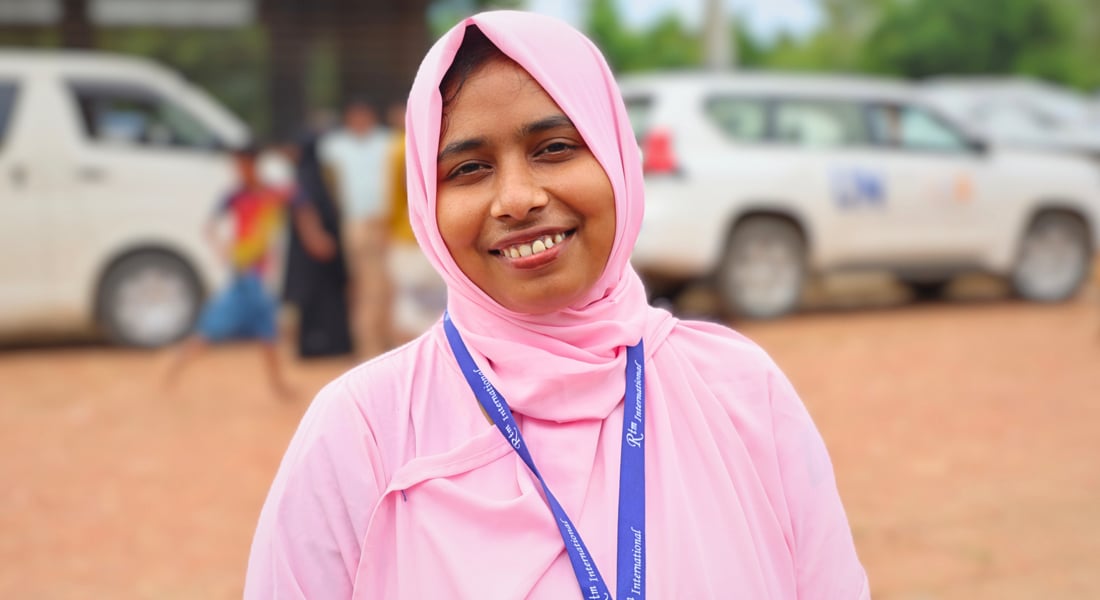
Bangladesh: Roksana is a supervisor of midwives in Cox’s Bazar refugee camp. “My journey is fuelled by a simple but powerful belief: no mother should ever have to fear childbirth,” she says. “I am committed to teaching, learning, and ensuring that every birth is a moment of joy and not a moment of sorrow.”
UNFPA’s Midwifery Life Saving Training was transformative for Roksana. It allowed her to engage in simulation exercises, elevating theoretical knowledge into practical skills. This newfound capability to handle life-threatening conditions such as severe bleeding, raised blood pressure in pregnancy, infections, and newborn resuscitation has been life-saving, Roksana says.
Her role is about building trust and delivering respectful maternity care. Roksana’s approach has created a positive environment in the community she serves. Mothers seek her out when they are ready to give birth, trusting her expertise and care. Community health workers refer to her as "Boro Apa (Elder Sister)," a term of respect and endearment.
Being a supervisor of midwives comes with its own set of challenges. Roksana faces issues like the lack of simulation dummies or models, making some mentoring situations challenging. Flooding is common in the camp during the increasingly torrential monsoons and long droughts in the dry season lead to dusty conditions where water is scarce. On top of all these issues, there is a critical shortage of midwives in Cox’s Bazar. This leads to a rush of patients in her facility, limiting the time available for proper mentorship. Despite these challenges, Roksana is committed. She seeks creative solutions to continue delivering quality care. ©UNFPA Bangladesh/Nusrat Mahmud Ananna READ MORE
Learn more
Minimum Initial Service Package - The minimum, life-saving sexual and reproductive health needs that humanitarians must address at onset of an emergency
GBV Area of Responsibility brings together non-governmental organisations, UN agencies, academics and others under the shared objective of ensuring life-saving, predictable, accountable and effective GBV prevention, risk mitigation and response in emergencies, both natural disaster and conflict-related humanitarian contexts)
Ending preventable maternal deaths in Asia and the Pacific /
The State of the World’s Midwifery Report - 2021 /
Global Standards for Midwifery Regulation /
Policy Brief: Quality Midwifery Education needs to address Minimum Global Standards /

